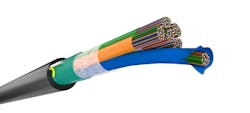Contour Flow High-Density Cable is the Centerpiece of Corning’s GlassWorks AI Product Portfolio
Corning introduced its GlassWorks AI portfolio of optical solutions at the Optical Fiber Communication (OFC) Conference and Exhibition in late March. The new Contour Flow Cable is the centerpiece of the GlassWorks product set. Contour Flow “accelerates and simplifies deployments of interconnected data center networks by fitting double the fiber into existing cable diameters,” Corning said when announcing GlassWorks AI, which it characterizes as a “one-stop shop of customized data center products and services to help operators build the dense fiber infrastructure required for generative AI.”
In addition to cable and connectivity products, GlassWorks AI includes planning, design, and deployment-support services from Corning.
At the heart of Contour Flow Cable is Corning SMF-28 Contour fiber, “a 40% smaller fiber offering improved bend resilience for high-density environments,” the company explained. “With its smaller diameter, SMF-28 Contour fiber is the key enabler of the cable and other connectivity solutions in the GlassWorks AI portfolio.”
“Operators face challenges of scale and density in meeting the infrastructure requirements of AI, both inside the data center and in the long-haul networks that connect them,” Corning added. “GlassWorks AI meets these needs with a wide array of technologies. Inside the AI data center, increasingly large clusters of graphical processing units require a dense optical infrastructure on a massive scale. Corning’s GlassWorks AI solutions meet this challenge as well, with high-density cables, shuffle solutions, optical hardware, and MMC-based connector assemblies that can accommodate 36 times more fiber connections within a data center rack than a legacy LC connector.”
Corning’s vice president and business director for data centers, Sean Kelly, commented, “With GlassWorks AI, Corning is drawing on its world-leading expertise in materials science to create breakthrough products that expand the possibilities of generative AI for our customers, both inside and outside the data center. Our new Contour Flow Cable is a great example of our innovations—helping data centers connect their city-to-city networks quickly and cost-effectively, delivering future-ready optical performance without the need for expensive infrastructure buildouts.”
In an interview with Cabling Installation & Maintenance, Corning’s director of market development Nilson Gabela described the value that Contour Flow Cable delivers to its users. “Our customers are looking to maximize duct space, trying to connect their data center networks to one another. Contour Flow Cable is 40% smaller, with better bend performance. This allows them to use their existing duct, which means no utility work—no new digging, no permits required.
“The cable includes peelable subunits, which reduces preparation time by 30%,” he further explained. “Not only is it a smaller cable; it also helps customers come up-to-speed faster. Users can mass-fusion splice 12 fibers at a time.”
Because the small-in-diameter SMF-28 Contour fiber has the same mode field diameter as traditional fibers, splicing the SMF-28 Contour to a traditional fiber is a seamless experience with high-performance results.
“When you get into highly bend-resilient fibers, many times to provide performance you must go to a smaller mode field diameter, which makes splicing more difficult,” the company said. “The SMF-28’s 9.2-micron mode field diameter works with fibers that exist in the network. It is a drop-in solution. We call the SMF-28 Contour ‘fiber without compromise.’”
Contour Flow Cable is available in an armored construction with up to 1728 fibers, a dielectric construction with up to 6912 fibers, and a jettable microcable construction with up to 864 fibers.
Facility saturation is a characteristic of the data center industry that has given rise to the need for solutions like the Contour Flow Cable, and that the cable along with the entire GlassWorks AI portfolio help resolve, Corning further pointed out. “The lack of access to land and power resources is a big problem, and one we’re helping to solve,” Corning said.
“Locations like Washington D.C. metro and Atlanta are saturated,” with some jurisdictions imposing moratoriums on new data center construction. “That forces service providers to go outside of that saturated area. The Contour Flow Cable and GlassWorks AI help them navigate and overcome access issues. Ultimately, that helps to strengthen the network and prepare it for the future.”

